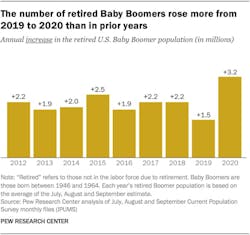Talent attraction and retention are among the most crucial and time-sensitive issues currently facing the construction industry, but according to Steve Bench, founder of Generational Consulting, the largest roadblock comes from generational differences rather than talent.
The key to attracting and retaining skilled workers is to first acknowledge and understand their generational differences and ultimately leverage their unique life experiences to create a cohesive team. In an education session at the 2023 International Builders’ Show, Bench outlined the steps to get there.
Understanding generational differences
“We’ve never had this many generations working side by side before, and each one has had a fundamentally different childhood,” says Bench. “They were raised differently, they were taught in school differently, they were parented much differently, but now, they’re all working together on the same projects. We need to figure out how to overcome these differences and turn them into strengths, because similarly, our vendors, suppliers, and clients are multi-generational.”
Today’s labor market is seeing baby boomers retire at a rate of several thousand per day, and according to Bench, not enough younger generations are stepping up to replace them. As a result, the employee has leverage over the employer with more open positions to choose from than people available to fill them.
Different generations are molded by their upbringings, which is why Bench says it only makes sense that baby boomers would have a much different work ethic and career mentality than millennials. “Millennials have more freedom, flexibility, and mobility than any generation in American history,” Bench explains. “As a result, many prioritize lifestyle over career, a luxury which older generations never enjoyed.”
Even though they may only be a few years younger, Gen Z, the future of the workforce, has even more vastly different demands. Responding to their needs, Bench claims, will not only bring them onboard, but will get them to stay long-term.
“Gen Z is more focused on mental health than any generation that came before them, and understandably so,” Bench says. “They feel like they’re inheriting a world that they’re about to be in charge of that is coming apart at the seams. As a result, they’re going to have very different expectations and demands than the generations before them. If they don’t see a reflection of themselves in the people they work with or if they don’t believe that their employer is socially responsible, then they’re going to go elsewhere because they have that choice.”
The pace of baby boomer retirements is accelerating.
Image: Pew Research Center
How to create a multi-generational company culture
The first step to creating a strong company culture, according to Bench, is to establish mindful and receptive mentors who are willing to look past stereotypes to effectively train and educate younger generations. “We are all products of the culture that raised us, and in both our personal lives and our professional lives, we have to find ways to work together.”
The key to that functionality is constant feedback, not just when mistakes are made, but when employees are also meeting or exceeding expectations. That feedback drives up loyalty, respect, and ultimately, retention rates. It also creates an opportunity for constructive criticism.
“Trust is the key to providing criticism,” Bench explains. “Employees may not handle criticism well if their mentors haven’t taken the time to gain their trust and get to know them. But if they know that their employers care about them because they got to know them as a person, they’ll be much more receptive to criticism rather than simply shutting down.” But building trust isn’t a one-size-fits-all solution. He adds, “Find some common ground, demonstrate vulnerability, and set your ego aside.”
Talent retention
In a digital age, retaining workers begins with first attracting fresh talent, and nowhere is it easier to connect with younger generations than on social media, Bench says. Not only is it important to connect and network with other industry leaders through platforms like LinkedIn, but brand promotion on Instagram, Facebook, and Twitter can also generate interest from prospective employees.
As of 2022, LinkedIn is made up of 706 million members, 50 million listed companies, and is available in 24 languages with members in 200 countries.
Image: LinkedIn
Once new hires are brought onto the team, providing them with opportunities for growth and advancement leads to more fulfillment. “Young professionals want access to new people, new information, new opportunities, and certification training so that they feel like they’re constantly thriving in their workplace,” Bench says.
That growth trajectory can be achieved by establishing more frequent milestones with shorter time horizons as well as benefits and recognition once those milestones are met. But according to Bench, that mentality isn’t just important for older generations looking to retain younger workers. Instead, it’s essential for all employees, regardless of age or experience.


